

China in 2020: Managing stress factors
As the MERICS China Forecast 2020 event opened in Berlin it was already clear the outbreak of deadly coronavirus flu in Wuhan would ratchet up all the key political and economic stress patterns we were asking our panellists to consider. For China, 2020 will be shaped by the still-unknowable consequences of the outbreak.
China enters the new decade in a radically different position from 10 years ago. Above all, the international repercussions of China’s problems and solutions have never been greater, as the ongoing debate over Huawei’s involvement in 5G telecoms infrastructures and the US-China trade tensions show.
Discussion centred on the CCP’s level of capability in managing stress factors, and the uneasy position Europe finds itself in, caught in the middle of US and China trade tensions. The hazards of managing the coronavirus epidemic and public responses to the government’s approach will go to the heart of China’s political system. Since 2013, the CCP’s approach under Xi Jinping has been deliberately rigid. “Never give in an inch, never relent,” was how Volker Stanzel, a former German ambassador to Beijing, described it.
Coronavirus outbreak throws up great risks to Xi’s legitimacy
Participants agreed that how the coronavirus flu outbreak is handled would be crucial for Xi’s authority. An outbreak of deadly flu, with millions of citizens under lockdown, throws up greater risks to legitimacy than even the crisis in Hong Kong, which was felt to be more manageable as it could be presented as due to external factors.
The structure of China’s party state was perceived as amplifying pressure: “In a party led dictatorship, every minor crisis is considered a test: Are they up to it? Can they manage it?” said Stanzel. The CCP’s claims to sole legitimacy put it at heightened risk of failure by stimulating scepticism for which there is no other target.
The crisis also demonstrates how China’s tight control of information breaks down when people are so directly affected. MERICS’ Kristin Shi-Kupfer pointed to “multiple efforts by citizen journalists to make up for lack of information from government” by using mobile phone video from hospital wards. It has enabled “remarkable venting of anger and information sharing despite censorship, and demonstrates the potential of China’s civil society,” she said.
CCP faces many dilemmas in 2020
The febrile situation created by the coronavirus epidemic provides a prism through which to view the CCP’s governance skills in the many dilemmas it faces, in particular the effectiveness of Xi’s reform of the party’s own ranks, the main governance reform on his watch. The CCP also faces other formidable challenges, such as a slowing economy and a policy U-turn by the United States that sharply politicizes their economic relationship.
China’s economic slowdown is likely to intensify, as Spring Festival sales have been lost. Panellists concluded from the parallel with SARS that economic impacts would not peak before Q2 at best. More broadly, China has shifted towards more consumer- driven growth, with wide implications. This transition is the underlying reason its economy is slowing and has implications for reorganising global supply chains, said Bert Hofman of the National University of Singapore.
Panellists discussed economic prospects for 2020 and, above all, how the EU and European governments could engage positively to triangulate between twin pressures from China and the United States. A new reality is generating a new realism in Europe, though possibly not fast enough, said Norbert Röttgen, Chairman of the Bundestag’s foreign affairs committee.
There was consensus that European businesses will suffer from the US-China ‘Phase One’ trade deal, specifically the procurement clause under which China pledged to buy US goods worth an additional USD 200 billion. European exports will likely drop. The political implications for European trade negotiations – including current talks toward a Comprehensive Agreement on Investment (CAI) hoped for later this year - are that “China uses agreement with the US to downplay agreements with the EU,” saying its choices are limited, warned Francois Godement of Institut Montaigne in Paris.
Europe needs to resist pressure from China and the US
Amid US pressure for Huawei’s exclusion from European 5G infrastructure, the panel explored how to deal with threats of retaliation from the US and China and still pursue the healthy triangulation that corresponds to European interests. “How will we deal with retaliation and protect our resilience which is based on innovation?” asked Röttgen, who believes 5G is fundamental to European innovation and Huawei’s market access should depend on reciprocity.
“Anticipating retaliation should not influence the debate,” argued Max Zenglein, head of economic research at MERICS. Decisions should be independent and informed, guided by European interests, he said. “We need an all-weather policy,” agreed Godement, adding that the dramatic US debate on Huawei is not one of principle for Europe: “Decoupling is an interest-based issue, that’s how we should have to deal with it.”
The year 2020 will see several significant summits; the EU-China summit in Beijing in spring and a German-led summit in Leipzig with Xi and the EU 27 in September.
One possible outcome of the Leipzig summit is the CAI, though panellists expect any deal to be minimal. Zenglein hoped high level summits would not be treated as the benchmark for EU-China relations, as it was crucial for long-term European interests to stand up to China’s demands and get progress. “Better to have a high-quality agreement than a showcase,” he said.
This event report of a conference held at MERICS on January 28 was compiled by Mary Hennock, a London-based journalist and former correspondent for Newsweek in China whose work has appeared in the Guardian and The Diplomat. For more on China-EU relations and China’s challenges in 2020, see Lucrezia Poggetti’s blog post on our recent MERICS survey.
